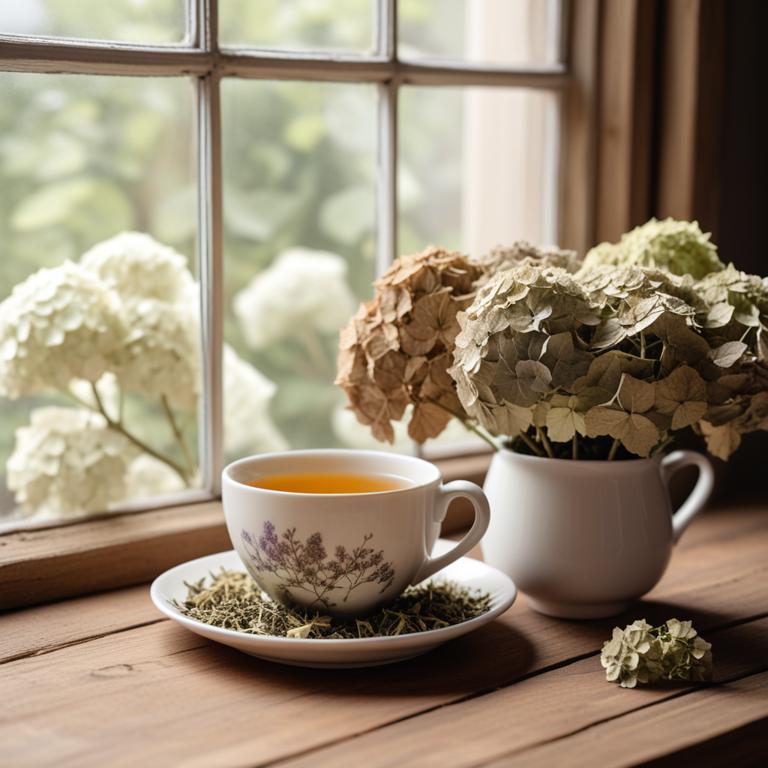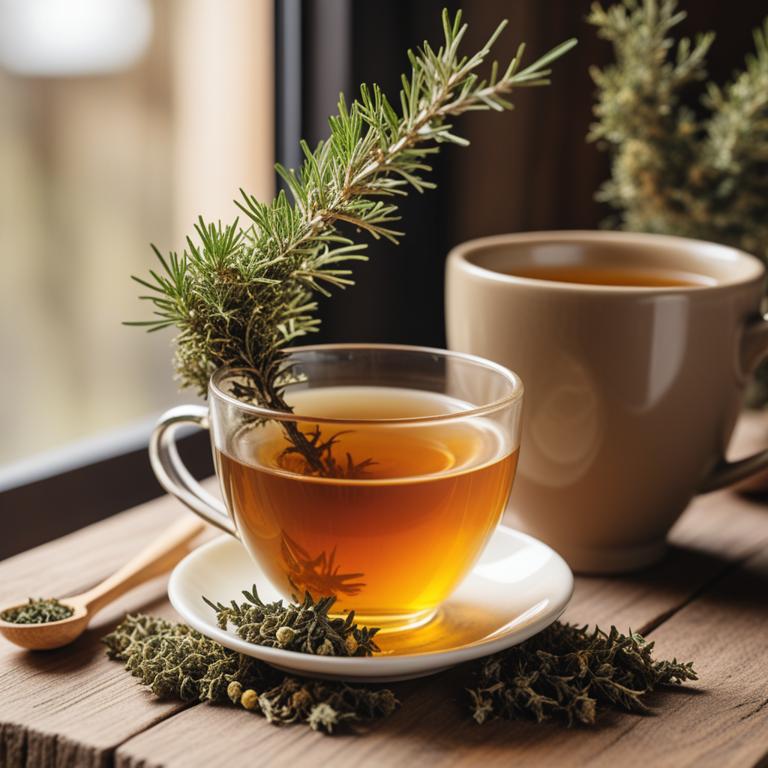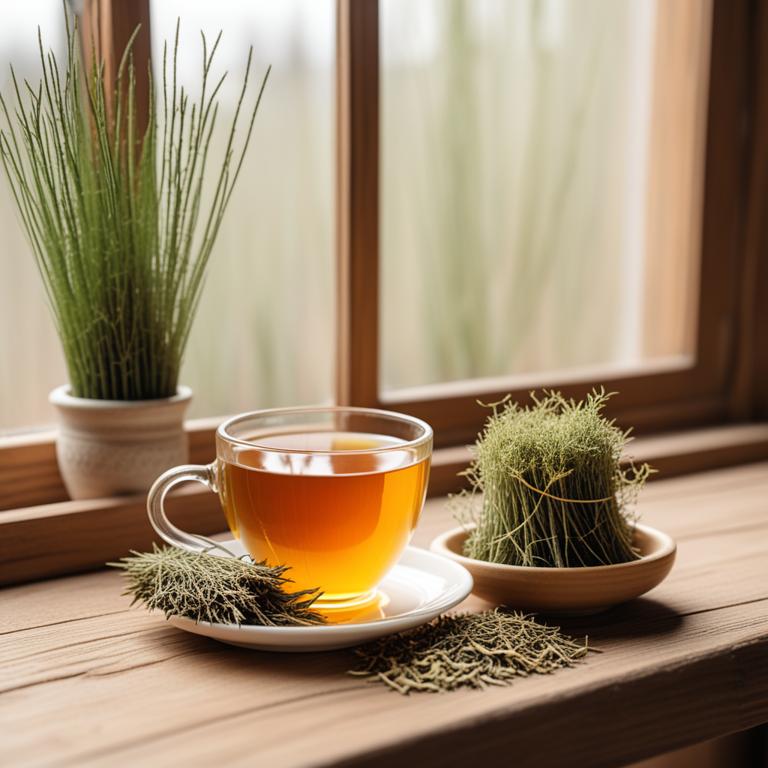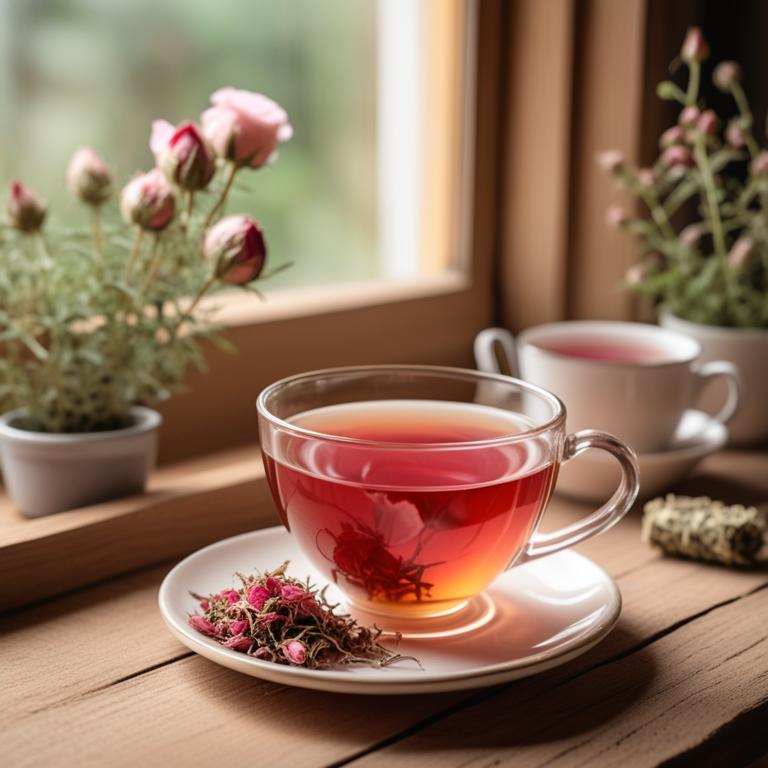9 Best Herbal Teas For Cystitis

Herbal teas for Cystitis are a natural remedy that involves drinking teas made from various herbs to alleviate the symptoms of cystitis, a common urinary tract infection characterized by painful urination, frequent urination, and other discomforts.
These herbal teas offer numerous benefits, including reducing inflammation, fighting off bacterial infections, and providing relief from pain and discomfort.
Some popular examples of herbal teas used to treat cystitis include Uva Ursi, which has antibacterial properties that help combat the infection; Juniper Berries, which have anti-inflammatory properties that reduce swelling and ease pain; Corn Silk, which has diuretic properties that help flush out bacteria; Dandelion Root, which helps to reduce inflammation and ease pain; and Marshmallow Root, which soothes and protects the urinary tract.
Additionally, other herbs like Horsetail, Parsley, and Sispeedin have also been used to treat cystitis due to their antibacterial, anti-inflammatory, and diuretic properties.
According to "International journal for vitamin and nutrition research. Internationale Zeitschrift fur Vitamin- und Ernahrungsforschung. Journal international de vitaminologie et de nutrition", teas for cystitis may be beneficial in reducing UTI recurrence due to their natural compounds that can inhibit UPEC adhesion and stimulate the host innate immune defenses.
Below there's a list of the 9 best herbal teas for cystitis.
- 1. Juniperus communis teas
- 2. Equisetum arvense teas
- 3. Vaccinium myrtillus teas
- 4. Sorbus aucuparia teas
- 5. Ribes nigrum teas
- 6. Rosa rubiginosa teas
- 7. Urtica dioica teas
- 8. Glycyrrhiza glabra teas
- 9. Zingiber officinale teas
Also you may be interested in...
TODAY'S FREE BOUNDLE
Herb Drying Checklist + Herbal Tea Shopping List + Medicinal Herbs Flashcards
Enter you best email address below to receive this bundle (3 product valued $19.95) for FREE + exclusive access to The Aphotecary Letter.
$19.95 -> $0.00
1. Juniperus communis teas

Juniperus communis teas have been traditionally used to treat cystitis, an inflammatory bladder condition.
The anti-inflammatory and antimicrobial properties of Juniperus communis teas help to reduce inflammation and combat bacterial infections, which are common causes of cystitis.
The bioactive constituents of Juniperus communis teas, including terpenes and flavonoids, have been found to have a relaxing effect on the urinary tract muscles, reducing spasms and alleviating symptoms of cystitis.
The benefits of using Juniperus communis teas to treat cystitis include reduced pain and discomfort, improved urinary function, and a decreased risk of complications associated with the condition.
2. Equisetum arvense teas

Equisetum arvense teas have been used traditionally to treat cystitis, a painful urinary tract infection.
The anti-inflammatory and antiseptic properties of this herbal preparation help to reduce pain and inflammation in the urinary tract, making it easier to urinate.
The bioactive constituents, including flavonoids, saponins, and phenolic acids, in Equisetum arvense teas have been found to have antimicrobial and antioxidant effects, which aid in treating the infection.
The benefits of using Equisetum arvense teas to treat cystitis include reduced symptoms, such as pain and burning sensations during urination, and a lower risk of complications, making it a promising natural remedy for this condition.
Related Study
According to "Urologie (Heidelberg, Germany)", Equisetum arvense teas may be used for the symptom-oriented treatment of recurrent cystitis.
3. Vaccinium myrtillus teas

Vaccinium myrtillus teas, also known as bilberry tea, have been traditionally used to treat cystitis, a common urinary tract infection.
The anti-inflammatory and antimicrobial properties of this herbal preparation help to soothe the bladder and urinary tract, reducing inflammation and combating bacterial infections that cause cystitis.
The bioactive constituents present in Vaccinium myrtillus teas, such as anthocyanins, flavonoids, and phenolic acids, contribute to their therapeutic effects by exhibiting antioxidant and antimicrobial activities that aid in the treatment of cystitis.
The benefits of using Vaccinium myrtillus teas to treat cystitis include reduced symptoms, improved bladder health, and a natural alternative to conventional medications, making it a popular choice among those seeking a holistic approach to urinary tract health.
4. Sorbus aucuparia teas

Sorbus aucuparia teas, also known as rowan teas, have been used to treat cystitis, a painful urinary tract infection.
The anti-inflammatory and antimicrobial properties of this herbal preparation help to soothe the bladder and urinary tract, reducing inflammation and preventing bacterial growth.
The bioactive constituents of Sorbus aucuparia teas, including flavonoids, phenolic acids, and terpenoids, contribute to its therapeutic effects, which aid in reducing symptoms such as burning sensations and frequent urination.
Regular consumption of Sorbus aucuparia teas has been found to provide relief from cystitis, promoting overall urinary health and well-being.
5. Ribes nigrum teas

Ribes nigrum teas have been traditionally used to treat cystitis, a common urinary tract infection characterized by painful urination and discomfort.
The anti-inflammatory and antimicrobial properties of this herbal preparation help to alleviate the symptoms of cystitis by reducing inflammation and preventing the growth of bacteria that cause the infection.
The bioactive constituents present in Ribes nigrum teas, including flavonoids, phenolic acids, and anthocyanins, possess antioxidant and anti-inflammatory properties that contribute to its therapeutic effects.
Regular consumption of Ribes nigrum teas has been found to provide relief from cystitis symptoms and promote overall urinary tract health.
6. Rosa rubiginosa teas

Rosa rubiginosa teas, also known as sweetbriar tea, have been used traditionally to treat cystitis, a common urinary tract infection.
The properties of this herbal preparation that help to treat cystitis include its anti-inflammatory and antimicrobial properties, which help to reduce inflammation and eliminate the bacteria causing the infection.
The bioactive constituents of Rosa rubiginosa tea, such as flavonoids and phenolic acids, have been shown to exhibit potent antimicrobial activity, helping to combat the infection and alleviate symptoms.
By consuming Rosa rubiginosa tea, individuals can benefit from its natural antiseptic properties, reducing the risk of complications and promoting a faster recovery from cystitis.
7. Urtica dioica teas

Urtica dioica teas, also known as nettle tea, have been traditionally used to treat cystitis, a common urinary tract infection characterized by painful urination, frequent urination, and burning sensations.
The anti-inflammatory and antimicrobial properties of this herbal preparation help to reduce inflammation and combat bacterial infections, thereby alleviating the symptoms of cystitis.
The bioactive constituents of Urtica dioica, including flavonoids, phenolic acids, and saponins, are responsible for its therapeutic effects, which help to soothe and protect the urinary tract.
The benefits of using Urtica dioica teas to treat cystitis include reduced pain and discomfort, improved urination, and a decrease in the risk of complications associated with urinary tract infections.
8. Glycyrrhiza glabra teas

Glycyrrhiza glabra teas have been traditionally used to treat cystitis, an inflammatory bladder condition, due to their anti-inflammatory and antimicrobial properties.
The bioactive constituents, including glycyrrhizin, flavonoids, and phenolic acids, help to reduce inflammation, alleviate pain, and prevent bacterial growth, thereby providing relief from the symptoms of cystitis.
By soothing the bladder and urinary tract, Glycyrrhiza glabra teas help to treat cystitis by reducing the frequency of urination, alleviating discomfort, and preventing further inflammation.
The benefits of using Glycyrrhiza glabra teas to treat cystitis include reduced symptoms, improved quality of life, and a natural alternative to conventional medications, making it a popular herbal remedy for this condition.
Related Study
According to the study, Glycyrrhiza glabra teas, as part of traditional herbal medicines (THMs), showed benefits in reducing urinary tract infection (UTI) events and recurrence rates, especially when combined with antibiotics.
9. Zingiber officinale teas

Zingiber officinale teas, derived from the rhizome of the ginger plant, have been traditionally used to treat cystitis, a common urinary tract infection.
The anti-inflammatory and antimicrobial properties of this herbal preparation help to reduce inflammation and combat bacterial growth in the urinary tract, thereby alleviating symptoms such as pain and burning sensation during urination.
The bioactive constituents present in Zingiber officinale teas, including gingerols and shogaols, exhibit potent analgesic and antiseptic properties, which contribute to their effectiveness in treating cystitis.
The benefits of using Zingiber officinale teas to treat cystitis include reduced pain and discomfort, prevention of complications, and promotion of overall urinary tract health.